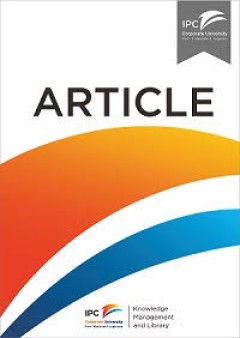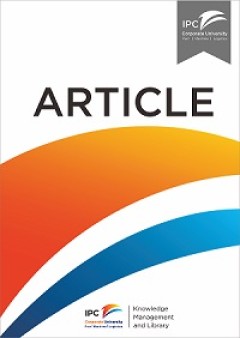Ditapis dengan

A non-structural test for competition in the container liner shipping industry
The liner shipping industry has experienced fundamental changes in recent years due to globalization, deregulation, horizontal/vertical integration, (increased) cooperation, rationalization, developments in information technology, consolidation and increased concentration. These developments may affect competition. As in other industries, competition in the (containerized) liner shipping indust…
- Edisi
- Maritime Logistics
- ISBN/ISSN
- -
- Deskripsi Fisik
- 17 halaman
- Judul Seri
- A non-structural test for competition in the container liner shipping industry
- No. Panggil
- ATC PO CHR a

Knowledge capture to inform sustainable maritime operations
Purpose - The purpose of this paper is to report an explicit taxonomy of maritime operations (MO) to guide Harbour Masters (HM)s of smaller ports in planning more sustainable operations. Design/methodology/approach – This research presents strategies for building theory to promote more sustainable port management in a two-stage research design. Starting from a base taxonomy in research stag…
- Edisi
- International Journal of Operations & Production M
- ISBN/ISSN
- -
- Deskripsi Fisik
- 25 halaman
- Judul Seri
- Knowledge capture to inform sustainable maritime operations
- No. Panggil
- ATC PO AND a

Are shippers satisfied with the diversified provision of logistics service by…
This paper explores the current feature of the service provision in the shipping industry and contributes to a more thorough understanding of the industry. A questionnaire was developed to examine the performance of service providers assessed by international shippers in the UK and South Korea. We find that British shippers are more likely to be satisfied with the diversified service provision …
- Edisi
- Volume 25 Number 2 December 2009 pp.237-251
- ISBN/ISSN
- -
- Deskripsi Fisik
- 15 p.
- Judul Seri
- Asian journal of shipping & logistics
- No. Panggil
- ATC LO JUN a

Are supply (driven) chains forgotten?
This paper explores the current feature of the service provision in the shipping industry and contributes to a more thorough understanding of the industry. A questionnaire was developed to examine the performance of service providers assessed by international shippers in the UK and South Korea. We find that British shippers are more likely to be satisfied with the diversified service provision …
- Edisi
- Volume 25 Number 2 December 2009 pp.237-251
- ISBN/ISSN
- -
- Deskripsi Fisik
- 15 p.
- Judul Seri
- The Assian Journal Shipping and Logistics
- No. Panggil
- ATC LO KOO a C.1

The role of public‐private partnership in port information systems development
- Edisi
- Vol. 14 Issue: 6, pp 482-499
- ISBN/ISSN
- -
- Deskripsi Fisik
- -
- Judul Seri
- The International Journal of Public Sector Management
- No. Panggil
- ATC PO BAG r
- Edisi
- Vol. 14 Issue: 6, pp 482-499
- ISBN/ISSN
- -
- Deskripsi Fisik
- -
- Judul Seri
- The International Journal of Public Sector Management
- No. Panggil
- ATC PO BAG r

A stochastic frontier model of the productive efficiency of Korean container …
A central objective of port privatization and/or deregulation policies is stimulating greater efficiency by engendering a more competitive market and commercial approach to management. Korea provides a prime example of a nation that is implementing such policies. Also, its ports play a pivotal role in world shipping, particularly in the ever-burgeoning container market. The success of these pol…
- Edisi
- 2003
- ISBN/ISSN
- 1466–4283
- Deskripsi Fisik
- 18p
- Judul Seri
- Applied Economics
- No. Panggil
- ATC LO CUL a

Container terminals in South Korea: problems and panaceas
Korea has achieved remarkable economic growth over the last three decades. This has largely been due to the adoption of export-oriented economic policies. This economic development has resulted in a rapid increase in export and import cargoes. Since the foreign trade of Korea is carried predominantly by sea transport (approximately 99.8% in terms of volume), ports play a crucial role in this pr…
- Edisi
- Vol 25
- ISBN/ISSN
- -
- Deskripsi Fisik
- 19 p.
- Judul Seri
- Maritime Policy & Management
- No. Panggil
- ATC LO CUL c

An analysis of the competitiveness of major liner shipping companies
This paper investigated if differences of the profits of the Korean and other global shipping companies were affected by the shipping route specialization. A panel data model was applied to nine shipping companies during the 2009-2015 period, to determine to what extent freight rate, bunker fuel prices, scale economies and chartered vessel ratios affected the profits. The results showed freight…
- Edisi
- -
- ISBN/ISSN
- -
- Deskripsi Fisik
- 28 p.
- Judul Seri
- The Asian Journal of Shipping and Logistics
- No. Panggil
- ATC LO HAY a

An analysis of market concentration in the Korean liner shipping industry
Korean shipping companies have seriously contemplated on pursuing economies of scale in order to tap the potential that Korea can generate for the seaborne cargo volume and fleet capacity, despite of latent pros and cons associated with the economies of scale. This paper shows the concentration ratio of the top four liner shipping companies in Korea is well below that of the global counterpart.…
- Edisi
- -
- ISBN/ISSN
- -
- Deskripsi Fisik
- 18 p.
- Judul Seri
- -
- No. Panggil
- ATC PO HAY a

Geography of mergers and acquisitions in the container shipping industry
The paper examines the geographic dimension between acquiring and target firms to take into account the information cost which decreases synergy effects generated by M&As in the container shipping industry. The paper finds that the geographical distance has a negative impact on takeover flows. M&A activities were more intense among firms located closely each other. The paper provides evidence t…
- Edisi
- Volume 29
- ISBN/ISSN
- -
- Deskripsi Fisik
- 23 p.
- Judul Seri
- -
- No. Panggil
- ATC PO YEO g

Integrated logistics information system in Korea
The transport infrastructure will provide the necessary capacity for freight movement and handling. However, the increase in the physical infrastructure alone is not a sufficient condition for the improvement of logistics systems. The logistics information capability which facilitates the seamless flow of information is a very important element in further enhancing the efficiency of logistics a…
- Edisi
- Vol. 10 Issue: 1, pp.43-51
- ISBN/ISSN
- -
- Deskripsi Fisik
- 11 p.
- Judul Seri
- Logistics Information Management
- No. Panggil
- ATC LO KAN i

Restructuring of the economy and its impacts on the Korean maritime industry
The Korean government has made many e orts to repair the damage done by the ® nancial crisis since November 1997. The restructuring programmes for the Korean economy, including chaebols’ (i.e. family-controlled conglomerates) restructuring, have impacted in many ways on the shipping, shipbuilding and port sectors. This is because major shipping lines, shipyards, and recent privatization an…
- Edisi
- VOL. 26, NO. 4, 311, 325
- ISBN/ISSN
- -
- Deskripsi Fisik
- 17 p.
- Judul Seri
- Maritime Policy & Management: The flagship journal of international shipping and port research
- No. Panggil
- ATC LO WOO r

Suppliers' affective trust and trust in competency in buyers: Its effect on c…
The purpose of this paper is to measure trust that logistics/supply chain management (SCM) managers of supplier firms perceive toward inbound SCM managers of buyer firms, and investigate the effect of trust on supply chain collaboration and logistics efficiency. In doing so, two trust forms are introduced: affective trust and trust in competency. Besides, supply chain collaboration includes the…
- Edisi
- Vol. 31 No. 1, 2011
- ISBN/ISSN
- -
- Deskripsi Fisik
- 26 p.
- Judul Seri
- International Journal of Operations & Production Management
- No. Panggil
- ATC LO CHO s
 Karya Umum
Karya Umum  Filsafat
Filsafat  Agama
Agama  Ilmu-ilmu Sosial
Ilmu-ilmu Sosial  Bahasa
Bahasa  Ilmu-ilmu Murni
Ilmu-ilmu Murni  Ilmu-ilmu Terapan
Ilmu-ilmu Terapan  Kesenian, Hiburan, dan Olahraga
Kesenian, Hiburan, dan Olahraga  Kesusastraan
Kesusastraan  Geografi dan Sejarah
Geografi dan Sejarah